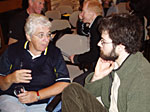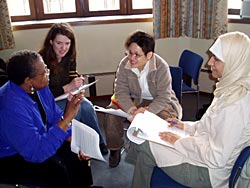The Art of Designing for Deep Learning
In the Long Run:
| CONFERENCE MENU | ||
| See information on our 2007 Conference | ||
For more than 25 years, the Foundation For Critical Thinking has emphasized and argued for the importance of teaching for critical thinking in a strong, rather than a weak, sense. We are committed to a clear and "substantive" concept of critical thinking (rather than one that is ill-defined); a concept that interfaces well with the disciplines, that integrates critical with creative thinking, that applies directly to the needs of everyday and professional life, that emphasizes the affective as well as the cognitive dimension of critical thinking, that highlights intellectual standards and traits. We advocate a concept of critical thinking that organizes instruction in every subject area at every educational level, around it, and on it, and through it.
 A substantive concept of critical thinking does not easily reduce to a single definition. Rather, it is illuminated by a range of definitions, each highlighting one of its multi-faceted dimensions: its role in intellectual analysis, evaluation, and reconstruction; its role in the array of disciplines (in historical thinking, in anthropological thinking, in sociological thinking, in artistic thinking, in scientific thinking, in the thinking of astronomers and engineers, and so forth); its role in reading, writing, and speaking; its role in investing, conducting research, and engaging in self-critique; its role in transcending parochialism, egocentrism, and sociocentrism; its role in living a healthy and fit life; its role in civic life; its role in detecting media bias and propaganda; its role in non-partisan, non-ideological ethical reasoning.
A substantive concept of critical thinking does not easily reduce to a single definition. Rather, it is illuminated by a range of definitions, each highlighting one of its multi-faceted dimensions: its role in intellectual analysis, evaluation, and reconstruction; its role in the array of disciplines (in historical thinking, in anthropological thinking, in sociological thinking, in artistic thinking, in scientific thinking, in the thinking of astronomers and engineers, and so forth); its role in reading, writing, and speaking; its role in investing, conducting research, and engaging in self-critique; its role in transcending parochialism, egocentrism, and sociocentrism; its role in living a healthy and fit life; its role in civic life; its role in detecting media bias and propaganda; its role in non-partisan, non-ideological ethical reasoning.
One implication of such an emphasis is this: that only through long-term planning can a substantive concept of critical thinking take root in instruction and learning. Critical thinking cannot be taught per se in any single course, or in any short period of time. Critical thinking is the key to educational reform and deep learning, but only when thought through carefully and deliberately, not through simplistic strategies. We need short-term strategies, of course. But without long-term planning, nothing substantial occurs. Deep learning does not result.
The sessions of the 26th International Conference on Critical Thinking will focus on long-term planning for critical thinking, whether by individual instructors focused on personal development and course redesign, or by a department, division, school, college, university, or other academic or social institution, or governmental agency for which critical thinking needs to be a crucial component.
With no long-term plan, there are no long-term goals. With no long-term goals, one cannot assess progress, development, or improvement. With no assessment of long-term improvement, there is no credible reason for claiming such improvement.
To become a critical thinker, in a strong sense, means, among other things, that you are committed to progressive improvement in your thinking and in your life. Every session at the conference will address the role of its content in long-term planning, will link its primary focus with "the long run." Consequently, conference participants will leave with a heightened awareness of their own role in long-term planning for critical thinking---IN A STRONG SENSE.
The weak sense view of critical thinking leaves the concept ill-defined and/or focuses on intellectual skills alone, setting aside the intellectual traits at the heart of a "strong sense" conception of critical thinking.
 |  |
| CONFERENCE MENU | ||
| See information on our 2007 Conference | ||